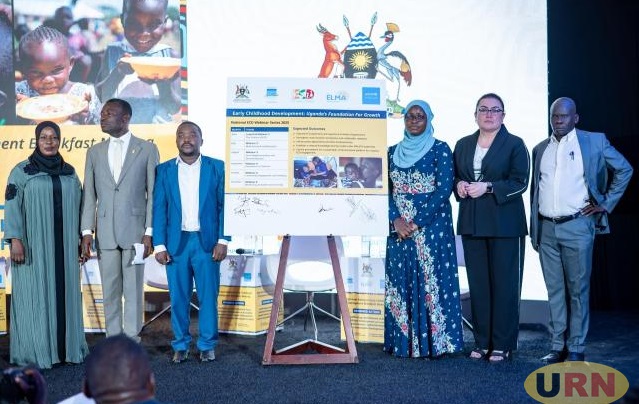
Kampala, Uganda | THE INDEPENDENT | The Ministry of Gender, Labour and Social Development (MGLSD) has partnered with UNICEF to strengthen Early Childhood Development (ECD) systems through webinar series. The six-month nationwide initiative, seeks to deepen public understanding of ECD, foster multi-sectoral coordination, and drive local-level action to ensure children get a foundation to survive, learn, and thrive.
Commencing this month, the program will run through the end of the year and serve as a national platform for knowledge exchange and policy dialogue. It is expected to converge policymakers, local governments, educators, health workers, civil society, and development partners to collectively shape solutions and accelerate implementation of Uganda’s Integrated Early Childhood Development (IECD) Policy.
Speaking at the program lunch, Aggrey David Kibenge, Permanent Secretary at the Ministry of Gender, said the government’s policy and planning frameworks strongly reflect this understanding. “The early years lay the foundation for lifelong wellbeing, productivity, and citizenship,” Kibenge said. “Investment in early childhood development is not just a social imperative, it is a strategic economic decision.”
The six-month webinar series will cover key thematic areas such as ECD financing, quality standards, inclusive access, local innovations, and cross-sectral collaboration. It will also provide an opportunity to spotlight successful models, identify implementation bottlenecks, and advocate for policy reforms at the national and district levels.
UNICEF’s Representative in Uganda, Robin Nandy, praised Uganda for its bold commitment to ECD but emphasized the need to translate plans into tangible impact. “Uganda has done well to put policies and strategies in place,” Nandy said. “But now is the time to match these with action. We urge leaders across all sectors to advocate for greater investment in early childhood development.”
Nandy also encouraged the country to consider a long-term goal of introducing compulsory pre-primary education, which he said would promote equity and ensure that all children begin primary school ready to learn and stay in school. “Together, let us ensure every Ugandan child regardless of where they are born has the opportunity not only to survive but to thrive,” he added.
“This initiative will help establish a national knowledge-sharing model under the Ministry of Gender’s leadership,” said Rogers Golooba, Senior Probation and Welfare Officer at the Ministry. “It is designed not only to increase awareness but also to strengthen governance capacity, stakeholder networks, and community engagement across the country.”
Uganda’s IECD Policy, was launched in 2016, and promotes a holistic, integrated approach to child development from conception to age eight combining health, nutrition, early learning, child protection, and social services. However, with limited access to quality early childhood services especially in rural and underserved areas its implementation remains uneven.
Currently, only about one in three children aged 3 to 5 attends an ECD centre. Uganda’s demographic profile, of over 50% of the population being under 18 years, underscores the need for intensified investment in the sector. “The early years of life are a critical window for brain development, emotional wellbeing, and learning potential. Evidence shows that children who receive proper care, nutrition, stimulation, and early education in their formative years are more likely to succeed in school, contribute productively to society, and lead healthier lives,” Golooba added.
According to the 2021 Uganda Demographic and Health Survey, 29% of children under five in Uganda are stunted a result of chronic under-nutrition and poor access to early stimulation. These challenges, combined with poverty, limited healthcare, and insufficient early learning facilities, highlight the urgent need for integrated, community-based solutions.
The IECD Policy was designed to address these barriers by aligning services across key sectors health, education, nutrition, protection, and social development. The new webinar series is expected to energize this effort by facilitating cross-sector learning and creating momentum for more inclusive and sustainable ECD interventions.
By using technology to connect stakeholders across Uganda and sharing evidence-based practices, the series has the potential to become a model for sustained engagement on early childhood development helping build a generation that is healthier, better educated, and more resilient. If the country, sustains this momentum and back its policy ambitions with targeted action and adequate funding, the country will not only secure better futures for its children but also strengthen the foundations of long-term national development.
****
URN
 The Independent Uganda: You get the Truth we Pay the Price
The Independent Uganda: You get the Truth we Pay the Price





